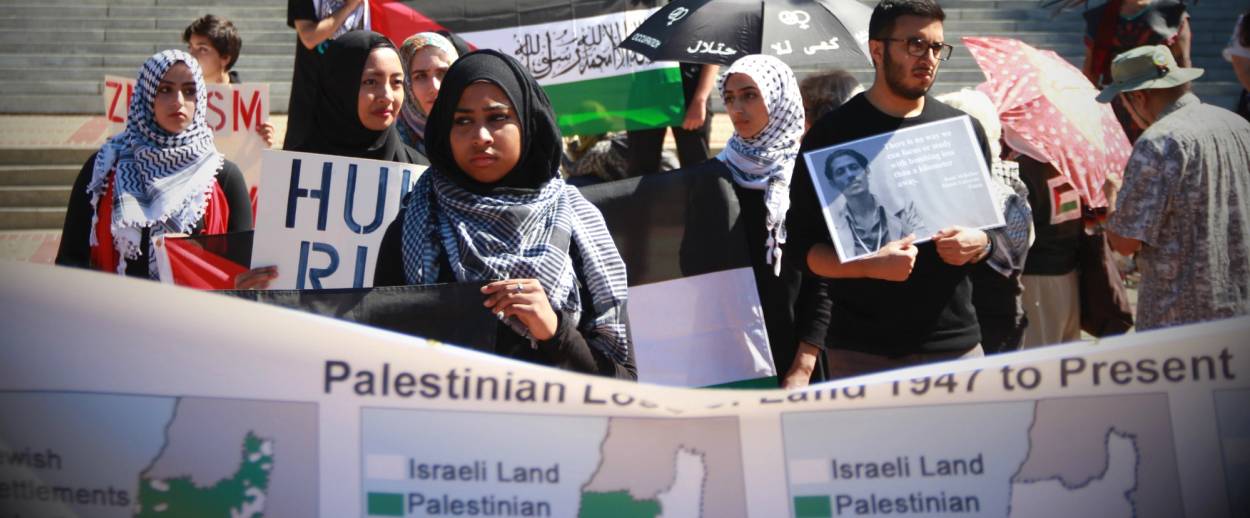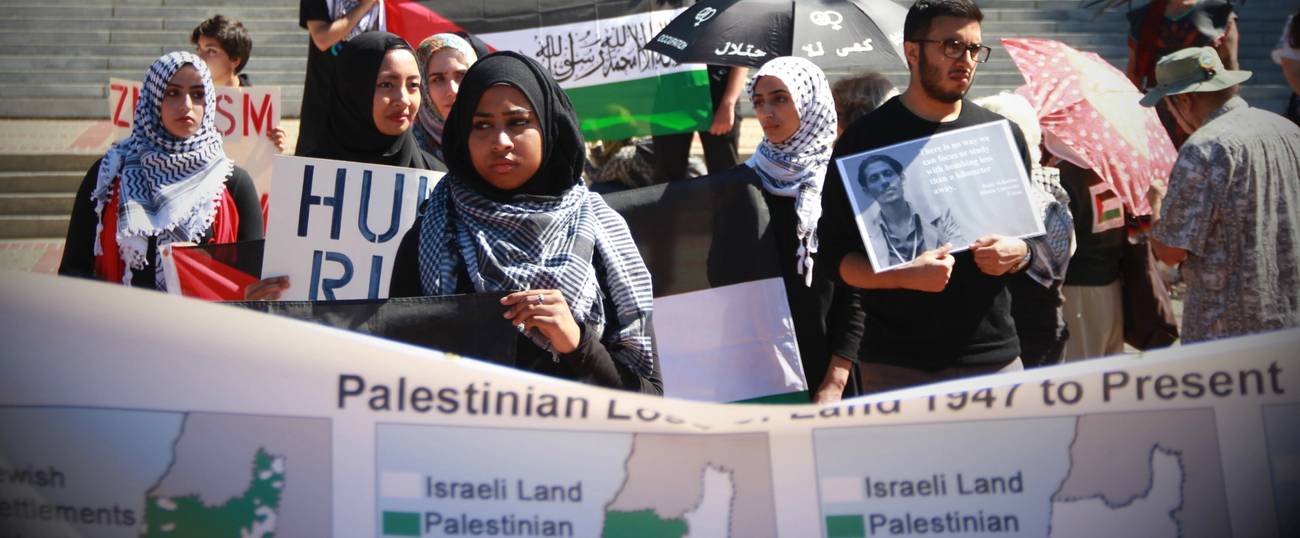Ismael Khoufaify, Director of Advocacy of the Governance Council of Minority & Marginalized Students at New York University, recently had a rough week. Swastikas had again been discovered in a campus building; someone in the dining halls marked Black History Month by serving watermelon kool-aid; some pro-Israel students expressed polite disagreement at a Jewish Voice for Peace anti-Israel hatefest. Khoufaify wrote on Facebook: “The last few days have sent me spiraling into a deep state of reflection. In the last week our NYU community has gone through hell and back. From swastikas, to kool-aid, to Zionism.” For Mr. Khoufaify, Nazism, racism, and Zionism were equally egregious.
Campus anti-Israel activists like to claim there is a “Palestine exception” to free speech, but from where we stand, Khoufaify’s flippant, arguably antisemitic, remark reflects what is really occurring on campuses all over the globe. Here are just a few more examples. Last week a University of Virginia panel featuring Israeli military reservists was forcefully disrupted, apparently violating multiple campus rules. Several days earlier, at the University of California at Berkeley, there was an antisemitic death threat against a Jewish professor. A week prior to that, students wishing to hear the moderate Israeli former minister Dan Meridor at London’s Kings College were confronted with a menacing mob of screaming demonstrators. At Princeton University in November the local Hillel chapter cancelled at the last minute a talk by Israel’s deputy Foreign Minister Tzipi Hotovely in response to pressure from “pro-peace” students. In January 2017 the School of Oriental and African Studies student union passed a resolution banning anyone affiliated with Zionist ideology from speaking on campus on any topic whatsoever. Other veritable mob scenes have also occurred in recent years, in some cases (the University of California at Irvine, University College London) requiring police intervention to escort audience members or speakers out of the venue.
Those complaining about the “Palestine exception” in fact are making themselves heard, and loudly—as they increasingly silence the Israel-friendly voice on campus and in the global “republic of letters.”
While some may see in Israel a prosperous (if flawed) liberal democracy facing unprecedented security challenges, the growing campus orthodoxy sees only an “apartheid regime” founded upon “racism,” “ethnic cleansing,” and “colonialist imperialism.” Zionism, anti-Israelists believe, can be neither defended nor corrected, both because the very idea of a Jewish state in that region depends on dispossession of others and because the concept of Jewish democracy is an offensive oxymoron. Israel, and Zionism, are thus cast as illegitimate, incorrigible abominations. The problem isn’t Israel’s alleged “crimes,” then, but its sinful essence. “A crime,” wrote Hannah Arendt, “is met with punishment; a vice can only be exterminated.”
A vice cannot be engaged. Evil cannot partake in a scholarly debate. You must under no circumstances “normalize” your relations with it. Anti-Israelists don’t want to hear what the other side says at all, nor let anyone else hear it, because to them there simply is no other side: they seek not to study or understand the lone Jewish state in the world (as scholars might do) but to destroy it. Painting it as an abomination is a crucial part of that strategy. They exchange the mantle of scholarship for activism, or use the mantle of scholarship as a cover for activism. As thinking-class activists they sacrifice the appropriate norms of scholarship and freedom of speech (including fairness and respect for truth), they violate basic community standards of civility and respectful discourse, and they downright harass and bully Israel-friendly individuals—as our forthcoming book documents.
As such, campus anti-Israelism isn’t merely an attack on Israel, or on Israel-friendly members of the campus community, or even Jews in general. It is an attack on the very norms and values of the university—and with it, on the norms and values at the heart of Western civilization. It corrodes scholarship, limiting the questions scholars ask and leading scholars to violate the most basic academic norms. It corrodes teaching and the classroom, turning what should be neutral spaces welcoming of diverse points of view into political advocacy forums that intimidate divergent voices. It corrodes entire departments and disciplines, diverting them from their subject matters. It corrodes academic organizations, which abandon their professional missions and disciplinary focus. It corrodes student governments, which year after year divert time and resources to a foreign policy matter concerning a complicated conflict half a world away rather than address students’ local concerns. It corrodes civility—indeed, its proponents often explicitly reject civility as a tool of oppression while at the same time use civility codes (such as charges of “hate speech”) to stifle dissent. With the deterioration of civility comes the corrosion of community. Anti-Israel hate campaigns on campus are stunningly divisive. They bring out animosity inconsistent with the efficient functioning of the institution. After such campaigns people stop speaking to colleagues, stop working together. How could you act collegially, after all, when anti-Israelists inform you unconditionally that your colleagues who support Jewish self-determination in their ancestral homeland are racist, genocidal, baby-killing ethnic cleansers?
Campus anti-Israelism does not operate like a genuinely academic movement governed by ordinary intellectual norms (such as objectivity, rigor, and the pursuit of truth) and moral or social norms (such as civility and respect). A movement governed by those norms would favor freedom of speech and welcome the diversity of views. But campus anti-Israelists refuse even to consider the possibility that Israel is not entirely evil and that Israeli Jews, being not entirely demonic, have their own legitimate claim to self-determination. No, anti-Israelism—in its many corrosive effects on all aspects of the academy, and particularly in its invasions, disruptions, and personal attacks—is about something much darker. Not dialogue, debate, and free exchange of ideas; not openness, pluralism and diversity, and the pursuit of knowledge that (ought to) characterize the Western university, as well as the civilization of which the university is the heart—but rather: Silencing.
Words, Jewish history teaches us, have consequences.

